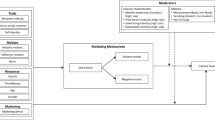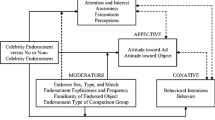Abstract
Despite the ubiquitous importance of money, the psychology of money has until recently received relatively little attention. While the literature has found that priming money has notable psychological consequences, little research has been done on the impact of priming money on consumer choice, particularly, their choice between hedonic and utilitarian options. The current research proposes that priming money will increase the likelihood of a prevention regulatory focus, and consequently, consumers will be more likely to choose more prudent alternatives when facing a trade-off between hedonic and utilitarian options. Results of four experiments show that participants in the money priming condition were more likely to choose utilitarian over hedonic options, compared with participants in the control condition. Furthermore, this effect was mediated by consumers’ situational prevention focus on the exposure to money primes, but attenuated when credit cards are primed.
Similar content being viewed by others
Notes
All tests in this paper are two-tailed tests.
References
Amato, P. R., & Rogers, S. J. (1997). A longitudinal study of marital problems and subsequent divorce. Journal of Marriage and Family, 59(3), 612–624.
Baumeister, R. F. (2002). Yielding to temptation: self-control failure, impulsive purchasing, and consumer behavior. Journal of Consumer Research, 28(4), 670–676.
Berry, C. J. (1994). The idea of luxury: a conceptual and historical investigation. New York: Cambridge University Press.
Briers, B., Pandelaere, M., Dewitte, S., & Warlop, L. (2006). Hungry for money: the desire for caloric resources increases the desire for financial resources and vice versa. Psychological Science, 17(11), 939–943.
Burgoyne, C. B., & Lea, S. E. G. (2006). Money is material. Science, 314(5802), 1091–1092.
Chatterjee, P., & Rose, R. L. (2012). Do payment mechanisms change the way consumers perceive products? Journal of Consumer Research, 38(6), 1129–1139.
Chatterjee, P., Rose, R. L., & Sinha, J. (2012). Why money meanings matter in decisions to donate time and money. Marketing Letters, 21(2), 1–10.
Chernev, A. (2004). Goal orientation and consumer preference for status quo. Journal of Consumer Research, 31(3), 557–565.
Dhar, R., & Wertenbroch, K. (2000). Consumer choice between hedonic and utilitarian goods. Journal of Marketing Research, 37(1), 60–71.
Feinberg, R. A. (1986). Credit cards as spending facilitating stimuli: a conditioning interpretation. Journal of Consumer Research, 13(3), 348–356.
Hansen, J., Kutzner, F., & Wänke, M. (2013). Money and thinking: reminders of money trigger abstract construal and shape consumer judgments. Journal of Consumer Research, 39(6).
Higgins, E. T. (1997). Beyond pleasure and pain. American Psychologist, 52(12), 1280–1300.
Higgins, E. T., Roney, C. J. R., Crowe, E., & Hymes, C. (1994). Ideal versus ought predilections for approach and avoidance: distinct self-regulatory systems. Journal of Personality and Social Psychology, 66(2), 276–286.
Hirschman, E. C., & Holbrook, M. B. (1982). Hedonic consumption: emerging concepts, methods, and propositions. Journal of Marketing, 46(3), 92–101.
Keller, P., Lee, A.Y., & Sternthal.B. (2004). Construing fit to judgment: the effects of regulatory focus and level of Construal. Working paper, Kellogg School of Management, Northwestern University.
Khan, U., & Dhar, R. (2005) A behavioral decision theoretic perspective on hedonic and utilitarian choice. In Ratneshwar, S. & Mick, D. G. (Eds.), Inside consumption: consumer motives, goals, and desires (pp. 144–165). London: Routledge.
Kivetz, R., & Zheng, Y. (2006). Determinants of justification and self-control. Journal of Experimental Psychology. General, 135(4), 572–587.
Liu, W., & Aaker, J. (2008). The happiness of giving: the time-ask effect. Journal of Consumer Research, 35(3), 543–557.
Mandel, N., & Johnson, E. J. (2002). When web pages influence choice: effects of visual primes on experts and novices. Journal of Consumer Research, 29(2), 235–245.
Maslow, A. H. (1970). Motivation and personality (2nd ed.). New York: Harper and Row.
Mogilner, C. (2010). The pursuit of happiness: time, money, and social connections. Psychological Science, 21(9), 1348–1354.
Mogilner, C., & Aaker, J. (2009). The time vs. money effect: shifting product attitudes and decisions through personal connection. Journal of Consumer Research, 36(2), 277–291.
Okada, E. M. (2005). Justification effects on consumer choice of hedonic and utilitarian goods. Journal of Marketing Research, 42(1), 43–53.
Pennington, G. L., & Roese, N. J. (2003). Regulatory focus and temporal distance. Journal of Experimental Social Psychology, 39(6), 563–576.
Pham, M. T., & Avnet, T. (2004). Ideals and thoughts and the reliance on affect versus substance in persuasion. Journal of Consumer Research, 30(4), 503–518.
Preacher, K. J., & Hayes, A. F. (2008). Asymptotic and resampling strategies for assessing and comparing indirect effects in multiple mediator models. Behavior Research Methods, 40, 879–891.
Prelec, D., & Loewenstein, G. (1998). The red and the black: mental accounting of savings and debt. Marketing Science, 17(1), 4–28.
Prelec, D., & Simester, D. (2001). Always leave home without it: a further investigation of the credit-card effect on willingness to pay. Marketing Letters, 12(1), 5–12.
Safer, D. (1998). Preference for luxurious or reliable products: promotion and prevention focus as moderators. Unpublished Dissertation, Columbia University, New York
Sengupta, J., & Zhou, R. (2007). Understanding impulsive eaters’ choice behaviors: the motivational influences of regulatory focus. Journal of Marketing Research, 44(2), 297–308.
Shiv, B., & Fedorikhin, A. (1999). Heart and mind in conflict: the interplay of affect and cognition in consumer decision making. Journal of Consumer Research, 26(3), 278–292.
Soman, D. (2001). Effects of payment mechanism on spending behavior: the role of rehearsal and immediacy of payments. Journal of Consumer Research, 27(4), 460–474.
Vohs, K. D., Mead, N. L., & Goode, M. R. (2006). The psychological consequences of money. Science, 314(5802), 1154–1156.
Zhao, X., Lynch, J. G., & Chen, Q. (2010). Reconsidering Baron and Kenny: myths and truths about mediation analysis. Journal of Consumer Research, 37(2), 197–206.
Zhou, R., & Pham, M. T. (2004). Promotion and prevention across mental accounts: when financial products dictate consumers’ investment goals. Journal of Consumer Research, 31(1), 125–135.
Zhou, X., Vohs, K. D., & Baumeister, R. F. (2009). The symbolic power of money: reminders of money alter social distress and physical pain. Psychological Science, 20(6), 700–706.
Acknowledgments
The authors thank the Marketing Letters Co-Editor Dr. Frank R. Kardes and two anonymous reviewers for their insightful and helpful comments. This work was supported by the National Natural Science Foundation of China (70972027, 71272027).
Author information
Authors and Affiliations
Corresponding author
Rights and permissions
About this article
Cite this article
Tong, L., Zheng, Y. & Zhao, P. Is money really the root of all evil? The impact of priming money on consumer choice. Mark Lett 24, 119–129 (2013). https://doi.org/10.1007/s11002-013-9224-7
Published:
Issue Date:
DOI: https://doi.org/10.1007/s11002-013-9224-7




